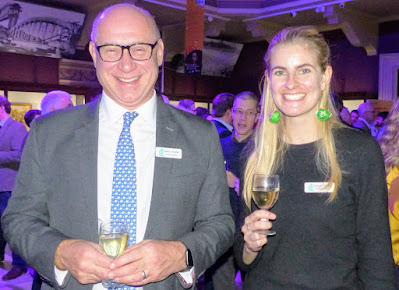The uncertainty regarding the Omicron variant is having a marked effect on Christmas celebrations, and tonight Barbara and I should have been in Truro for the Cornish Lithium Christmas party, which has been cancelled, as it was last year due to the pandemic.
A great pity as I was looking forward to congratulating Dr. Lucy Crane, firstly on recently becoming a mum, and on her excellent presentation on the importance of mining at last month's Conference on Critical Minerals and The UK’s Green Industrial Revolution. This forum was organised by the Geological Society Business Forum, Institute of Materials, Minerals and Mining (IOM3) and MEI Conferences' industry associate the Critical Minerals Association.
It would also have been good to talk to Cornish Lithium's CEO and Founder, Jeremy Wrathall on his appointment to the UK’s Critical Minerals Expert Committee, together with a select number of industry and academic experts.
The formation of the Committee is a key element of the UK Government’s Net Zero Strategy and is the first of its kind in the UK, to provide independent advice to government on the scope and content of a critical minerals strategy. The Committee will also define and publish an updated list of these minerals to guide government investment decisions. The resulting UK Critical Minerals Strategy will be published in 2022, setting out the UK’s approach to securing the technology critical minerals and metals. Through this strategy, the UK government will seek to support the engagement of the UK’s mining sector in new and existing markets, facilitating investment and collaboration in extraction and processing opportunities.
 |
| Jeremy and Lucy at the last Cornish Lithium Christmas Party in 2019 |
Cornish Lithium is pushing forwards with developing a sustainable domestic source of lithium for the benefit of the UK. Last month the company secured £18m of funding from Investment company TechMet, which will help fund Cornish Lithium’s plan to establish a UK-based supply of battery metals used in EVs.
Cornish Lithium said the UK needs an estimated 75,000 tonnes of lithium carbonate equivalent by 2035 to meet growing demand. By comparison, in 2020, Portugal – Europe’s largest lithium producer – produced about 1,200 tonnes of lithium. The UK government has made the extraction and supply of minerals such as lithium a priority and Cornish Lithium called the funding from TechMet “transformational”, adding that it would “significantly accelerate” its projects.
This will allow further drilling of geothermal evaluation boreholes and developing associated direct lithium extraction sites to further demonstrate Cornwall’s prospectivity for lithium contained in geothermal waters (posting of 18 September 2020). The Company will also progress studies into the possibility of using heat from these boreholes to decarbonise local industries in Cornwall.
The funding will also aid the construction of a beneficiation and hydrometallurgical demonstration plant that will enable the Company to optimise the low carbon Lepidico processing technology for the Trelavour Project (posting of 10 December 2020) for the extraction of lithium from zinnwaldite and polylithionite mica ores in the St Austell region. Only a wek ago Cornish Lithium announced the Maiden JORC Resource Statement for The Trelavour Project.
Hopefully there will be much to report in 2022!

















Barry, It looks as though we are still not out of the "woods(misery). We may have words like "critical minerals" from a different perspective; but for me, all come from ore bodies. We need closer interaction with geoscientists to ensure proper exploitation of ore bodies."Electric vehicles, green energy, lithium, hydrogen, ethanol--hope some groups focus and bring more clarity so that the world would have a "proper and sustainable road map--Whatever may be the future, we need minerals because anything to produce or make, we need vessels and units which in turn have to be made from minerals--so the mineral industry needs more innovation to recover all minerals and elements for generations to come. May be, I am a mineral engineer and so the above.
ReplyDelete